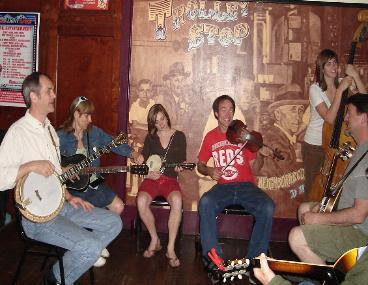One thing you can do to create controversy is to start a conversation about whether Old Time musicians ought to play Bluegrass or not. This is a bit like Hatfields fraternizing with McCoys, so watch out or you might get hit!
On the other hand, many of the casual listeners are not even aware of the difference. If the band has a banjo, that usually signals "Bluegrass" to many casual fans.
So what is the difference? Well, you get different answers from different people, but to me the main difference is that bluegrass is characterized by a fingerpicked banjo (a style invented by Earl Scruggs, imho, with later styles emerging thereafter). Bluegrass became stylized around 1945 when Earl and guitar player Lester Flatt joined mandolin player Bill Monroe and the Bluegrass Boys. Hence Bluegrass often has a guitar lead. By contrast, Old Time has a rhythmic "clawhammer" style banjo, and usually a fiddle lead. This music existed before bluegrass. Not everyone agrees, but I believe Old Time is more conducive to jams than other styles, because it is easier to blend several clawhammer banjos, whereas the Scruggs style is so overpowering that it is hard to have more than one banjo player in the group.
So that brings us to the next point. Is it kosher for Old Time jams to jam to songs from Bill Monroe, the father of Bluegrass?
At the Trolley stop, we've started to do My Little Georgia Rose, with Ryan playing lead vocals and guitar. However, we still play it with an Old Time sound, usually with two or three guitars and a couple of clawhammer banjos. I'm by no means an authority, as probably the weakest musician in our group, but in my humble opinion it works very well and the fan response has been great.
However, I do have a few observations to share about the great Bill Monroe. One thing about his songs
is that often the sentiment doesn't match the song. For example,
Little Georgia Rose tells about a sweet young woman that the singer has a
big crush on. It is a very sweet and sentimental lyric.
But
the melody is completely different. It's a very powerful melody, almost like a hymn. Let's just say that you could play it for the
Heavyweight Champion of the World as easily as some little sweetheart in George! In particular, the chorus is sung by a lot
of power, both by Bill Monroe back in the day, and by the Trolley
Stoppers today. We really boom "She's MY LITTLE GEORGIA ROSE!" This is actually not that unusual in Bill Monroe's songs. Check out his version of Shady Grove (Ray Hicks has two great version on his new album http://www.reverbnation.com/play_now/song_2039956 Shady Grove 2 is the more traditional version, while Shady Grove 1 is based on the Monroe version). The line "I'm going back to Harlan!" makes it sound llike something dramatic is about to happen.
Once you get your mind around that little quirk, the rest of it starts to hang together. The fact is, Monroe may be considered the Father of Bluegrass to many (though in my humble opinion Earl Scruggs was the single most influential individual, albeit in Monroe's band), but his songs are certainly amenable to the Old Time style.
At the Trolley Stop, we play this in the key of C. The Bill Monroe video, which comes to us courtesy of the Grand Ole Opry circa 1957, is in the key of B-flat, meaning the guitar needs to be capo'ed at the fourth fret to play along.
So for what it's worth, my take is, heck yeah we can do Bill Monroe songs in an Old Time jam. It works great with a fiddle lead and a couple of clawhammer banjos playing along side. Just don't use no Moog synthesizers or nothin', y'hear?
Once you get your mind around that little quirk, the rest of it starts to hang together. The fact is, Monroe may be considered the Father of Bluegrass to many (though in my humble opinion Earl Scruggs was the single most influential individual, albeit in Monroe's band), but his songs are certainly amenable to the Old Time style.
At the Trolley Stop, we play this in the key of C. The Bill Monroe video, which comes to us courtesy of the Grand Ole Opry circa 1957, is in the key of B-flat, meaning the guitar needs to be capo'ed at the fourth fret to play along.
So for what it's worth, my take is, heck yeah we can do Bill Monroe songs in an Old Time jam. It works great with a fiddle lead and a couple of clawhammer banjos playing along side. Just don't use no Moog synthesizers or nothin', y'hear?
My Little Georgia Rose
Written and recorded by Bill Monroe
G(C) C(F) G(C)
Now come and listen to my story
G(C) D(G)
A story that I know is true
G(C) C(F) G(C)
About a Rose that blooms in Georgia
G(C) D(G) G(C)
With a hair of gold and a heart so true
C(F) G(C)
Way down past the Blue Ridge Mountains
G(C) D(G)
Way down where tall pines grow
G(C) C(F)
Lives my sweetheart of the mountains
G(C) D(G) G(C)
She's my little Georgia Rose
Her mother left her with another A care free life she had planned The baby now is a lady The one her mother could not stand Chorus We'd often sing those songs together I watch her do her little part She'd smile at me when I would tell her That she was my own sweetheart


